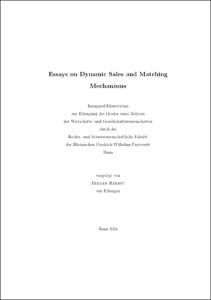Herbst, Holger: Essays on Dynamic Sales and Matching Mechanisms. - Bonn, 2016. - Dissertation, Rheinische Friedrich-Wilhelms-Universität Bonn.
Online-Ausgabe in bonndoc: https://nbn-resolving.org/urn:nbn:de:hbz:5-45174
Online-Ausgabe in bonndoc: https://nbn-resolving.org/urn:nbn:de:hbz:5-45174
@phdthesis{handle:20.500.11811/6827,
urn: https://nbn-resolving.org/urn:nbn:de:hbz:5-45174,
author = {{Holger Herbst}},
title = {Essays on Dynamic Sales and Matching Mechanisms},
school = {Rheinische Friedrich-Wilhelms-Universität Bonn},
year = 2016,
month = oct,
note = {This thesis consists of three chapters on topics in dynamic mechanism design and dynamic optimization.
The first chapter studies optimal contract design by a firm which faces consumers who know how important the good is to them but only later learn which variant of the good they favor. Exchange policies with varying flexibility are employed as a price discrimination device. I provide a novel reason for the occurrence of partially restrictive exchange policies. Optimal contracts specify a price, an initial product choice, and a limited range of products within which exchange is costless. Crucially, optimal contracts do not use exchange fees to govern exchanges. This contrasts with standard results in the literature on sequential screening.
The second chapter considers a monopolist who sells horizontally differentiated goods to a buyer who learns his valuations for the goods gradually over time. We analyze when a menu of contracts with exchange fees maximizes the seller's profits. The use of exchange fees is optimal if two key properties are satisfied: When contracting takes place, the buyer is uncertain about his difference in valuations and the seller does not know which magnitude of differences the buyer roughly expects. We provide several foundations when this is the case. The contracts in the optimal menu consist of a price payed upfront for an initially obtained good and an exchange fee. Contracts with higher upfront prices have lower exchange fees. Exchange fees are not beneficial when buyers initially only differ in their belief which good they prefer but expect similar magnitudes of valuation differences.
The third chapter paper studies the trade-off between realizing match values early and waiting for good matches that arises in a dynamic matching model with discounting. We consider heterogeneous agents that arrive stochastically over time to a centralized matching market. First, we derive the welfare-maximizing assignment rule, which displays the subtle trade-off between matching agents early and accumulating agents to form assortative matches. Second, we show that the welfare-maximizing policy is implementable when agents have private information about their types. The corresponding mechanism satisfies natural requirements. Furthermore, we identify situations in which the designer can abstain from using monetary incentives.},
url = {https://hdl.handle.net/20.500.11811/6827}
}
urn: https://nbn-resolving.org/urn:nbn:de:hbz:5-45174,
author = {{Holger Herbst}},
title = {Essays on Dynamic Sales and Matching Mechanisms},
school = {Rheinische Friedrich-Wilhelms-Universität Bonn},
year = 2016,
month = oct,
note = {This thesis consists of three chapters on topics in dynamic mechanism design and dynamic optimization.
The first chapter studies optimal contract design by a firm which faces consumers who know how important the good is to them but only later learn which variant of the good they favor. Exchange policies with varying flexibility are employed as a price discrimination device. I provide a novel reason for the occurrence of partially restrictive exchange policies. Optimal contracts specify a price, an initial product choice, and a limited range of products within which exchange is costless. Crucially, optimal contracts do not use exchange fees to govern exchanges. This contrasts with standard results in the literature on sequential screening.
The second chapter considers a monopolist who sells horizontally differentiated goods to a buyer who learns his valuations for the goods gradually over time. We analyze when a menu of contracts with exchange fees maximizes the seller's profits. The use of exchange fees is optimal if two key properties are satisfied: When contracting takes place, the buyer is uncertain about his difference in valuations and the seller does not know which magnitude of differences the buyer roughly expects. We provide several foundations when this is the case. The contracts in the optimal menu consist of a price payed upfront for an initially obtained good and an exchange fee. Contracts with higher upfront prices have lower exchange fees. Exchange fees are not beneficial when buyers initially only differ in their belief which good they prefer but expect similar magnitudes of valuation differences.
The third chapter paper studies the trade-off between realizing match values early and waiting for good matches that arises in a dynamic matching model with discounting. We consider heterogeneous agents that arrive stochastically over time to a centralized matching market. First, we derive the welfare-maximizing assignment rule, which displays the subtle trade-off between matching agents early and accumulating agents to form assortative matches. Second, we show that the welfare-maximizing policy is implementable when agents have private information about their types. The corresponding mechanism satisfies natural requirements. Furthermore, we identify situations in which the designer can abstain from using monetary incentives.},
url = {https://hdl.handle.net/20.500.11811/6827}
}






